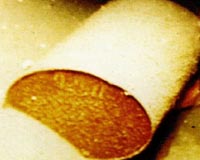 |
Tel Aviv, Israel (SPX) Nov 12, 2010 A Tel Aviv University scientist leads a research team that has developed a powerful electronic sensor to detect multiple kinds of explosives - including those used in the recent Yemeni bomb threat. Based on nanotechnology advances, the new sensor is small, portable, and is more sensitive and reliable at detecting explosives than any sniffer dog, says its lead researcher Prof. Fernando Patolsky of Tel Aviv University's Raymond and Beverly Sackler School of Chemistry. With scientific findings on it published recently in the prestigious Angewandte Chemie, the new device is attracting considerable attention from security companies and fellow scientists. Capable of detecting numerous types of explosives, Prof. Patolsky says the sensor is especially effective at detecting TNT. Existing methods and devices used to trace the explosive have the drawbacks of high cost, lengthy decoding times, size, and a need for expert analyses: "There is a need for a small, inexpensive, handheld instrument capable of detecting explosives quickly, reliably and efficiently," says Patolsky. According to the researchers, this new sensor can out-sniff even a champion sniffer canine.
Portable and hidden from view In order to enhance the chips' sensitivity even further, the scientists developed each one with 200 individual sensors that work in harmony to detect different kinds of explosives with an unprecedented degree of reliability, efficiency and speed. One major advantage of the new sensor is its portability - it can be carried from place to place by hand. It is also capable of detecting explosives at a distance. It can be mounted on a wall, with no need to bring it into contact with the item being checked. And unlike other explosives sensors, it enables definitive identification of the explosive that it has detected. To date. the device has not had a single detection error. Security companies are taking note. The American company Nanergy Inc. has developed a prototype based on the patent, and is already in contact with potential partners to develop explosives sensors for the commercial market. Headed by Prof. Patolsky, who recently returned to Israel from Harvard University, the research team is considered to be one of the world's leaders in developing nano-based sensors that can detect chemical and biological molecules. Such sensors may be used to detect not only explosives, but also biological toxins and threats, such as anthrax, cholera or botulinum. Looking beyond national security, the sensor offers attractive applications in the medical field as well.
Share This Article With Planet Earth
Related Links AFTAU The Long War - Doctrine and Application
 New Way Of Detecting Concealed Radioactive Material
New Way Of Detecting Concealed Radioactive MaterialWashington DC (SPX) Nov 12, 2010 Researchers at the University of Maryland have proposed a scheme for detecting a concealed source of radioactive material without searching containers one by one. Detection of radioactive material concealed in shipping containers is important in the early prevention of "dirty" bomb construction. The concept, described in the Journal of Applied Physics, is based on the gamma-ray emiss ... read more |
|
| The content herein, unless otherwise known to be public domain, are Copyright 1995-2010 - SpaceDaily. AFP and UPI Wire Stories are copyright Agence France-Presse and United Press International. ESA Portal Reports are copyright European Space Agency. All NASA sourced material is public domain. Additional copyrights may apply in whole or part to other bona fide parties. Advertising does not imply endorsement,agreement or approval of any opinions, statements or information provided by SpaceDaily on any Web page published or hosted by SpaceDaily. Privacy Statement |